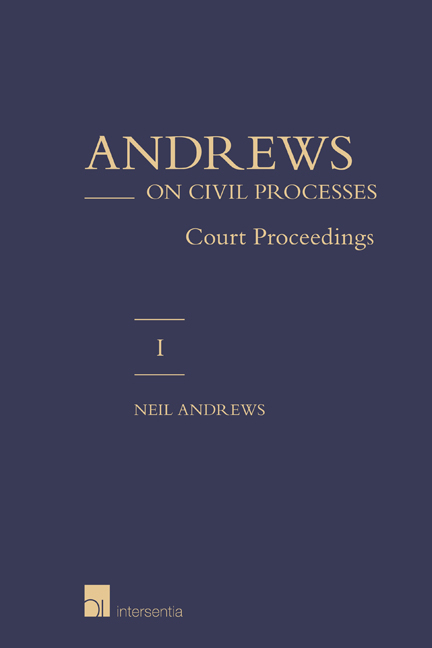Book contents
- Frontmatter
- Dedication
- Epigraph
- Preface
- Contents
- Table of Cases
- Table of Statutes
- Table of Statutory Instruments
- PART I INTRODUCTION TO THE FORMS OF CIVIL JUSTICE
- PART II COMMENCEMENT OF COURT PROCEEDINGS AND PREPARATION FOR TRIAL
- PART III END-GAME: TRIAL, APPEAL, FINALITY AND ENFORCEMENT
- Chapter 14 Trial and Judgment
- Chapter 15 Appeals
- Chapter 16 Finality in Court Proceedings
- Chapter 17 Enforcement of Court Judgments and Orders
- PART IV COSTS AND FINANCING OF LITIGATION
- PART V SPECIAL PROCEEDINGS
- PART VI PRINCIPLES OF CIVIL LITIGATION
- PART VII THE EUROPEAN CONTEXT
- Select Bibliography
- Index to Volumes I and II
Chapter 17 - Enforcement of Court Judgments and Orders
from PART III - END-GAME: TRIAL, APPEAL, FINALITY AND ENFORCEMENT
Published online by Cambridge University Press: 13 December 2017
- Frontmatter
- Dedication
- Epigraph
- Preface
- Contents
- Table of Cases
- Table of Statutes
- Table of Statutory Instruments
- PART I INTRODUCTION TO THE FORMS OF CIVIL JUSTICE
- PART II COMMENCEMENT OF COURT PROCEEDINGS AND PREPARATION FOR TRIAL
- PART III END-GAME: TRIAL, APPEAL, FINALITY AND ENFORCEMENT
- Chapter 14 Trial and Judgment
- Chapter 15 Appeals
- Chapter 16 Finality in Court Proceedings
- Chapter 17 Enforcement of Court Judgments and Orders
- PART IV COSTS AND FINANCING OF LITIGATION
- PART V SPECIAL PROCEEDINGS
- PART VI PRINCIPLES OF CIVIL LITIGATION
- PART VII THE EUROPEAN CONTEXT
- Select Bibliography
- Index to Volumes I and II
Summary
MONEY JUDGMENTS
Fundamental to this topic is the axiom that judgment creditors are free to choose from the portfolio of available enforcement methods. Some creditors might already have extensive knowledge of the defendant's assets. Others will remain in the dark; for these, the next two paragraphs might be illuminating.
Judgment creditors can apply for an order compelling a judgment debtor (or in the case of a company, one of its officers) to attend the court and to supply information concerning the debtor's means and financial commitments.
If the judgment debtor is a company, CPR Part 71 enables an order to be made for information to be supplied by the company's officers. But the House of Lords held in Masri v. Consolidated Contractors International Co SAL (2009) that CPR Part 71 does not enable an order for examination to be made against an officer who is outside the jurisdiction, and that CPR Part 6 provides no basis for service out of the jurisdiction of any such order, had it been possible to make one.
Sections 95–105 of the Tribunals, Courts, and Enforcement Act (‘TCE Act 2007’: 17.08) create new methods of obtaining information concerning debtors’ assets and indebtedness.
Money judgments can be enforced by:
(i) a writ of fiery facias or warrant of execution (these are to re-named ‘writs of control’ and ‘warrants of control’ by the TCE Act 2007);
(ii) a third party debt order;
(iii) a charging order (against land), stop order (against securities or funds in court), or a stop notice (against securities);
(iv) by appointment of a receiver. Some types of pecuniary enforcement are available only in county courts:
(v) attachment of earnings orders; and
(vi) ‘administration orders’ (Part 5 of the TCE Act 2007 introduces various categories of protection for debtors in this context).
State Immunity and Enforcement of Foreign Judgments: The Supreme Court of the United Kingdom in NML Capital Ltd v. Republic of Argentina (2011) held that the State Immunity Act 1978 has the effect that a foreign judgment against a state concerning a commercial transaction (on these facts, a New York judgment concerning bonds issued by Argentina) could be recognised and enforced in England.
- Type
- Chapter
- Information
- Andrews on Civil ProcessesCourt Proceedings, pp. 495 - 516Publisher: IntersentiaPrint publication year: 2013
- 1
- Cited by



